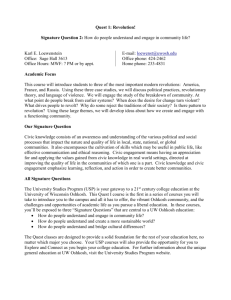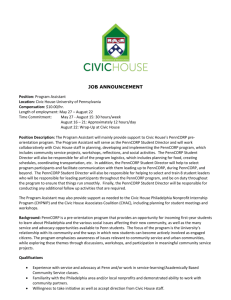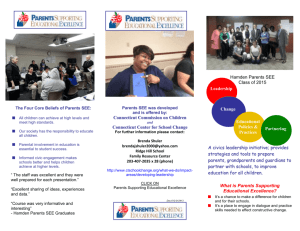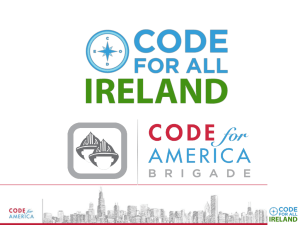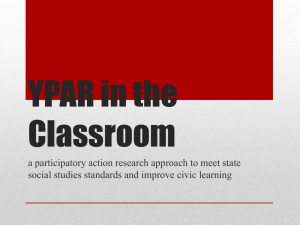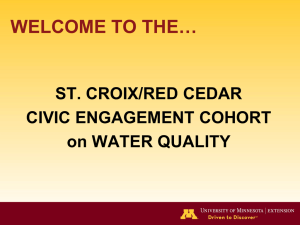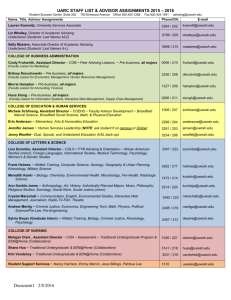Form A- Loewenstein- Quest 1
advertisement
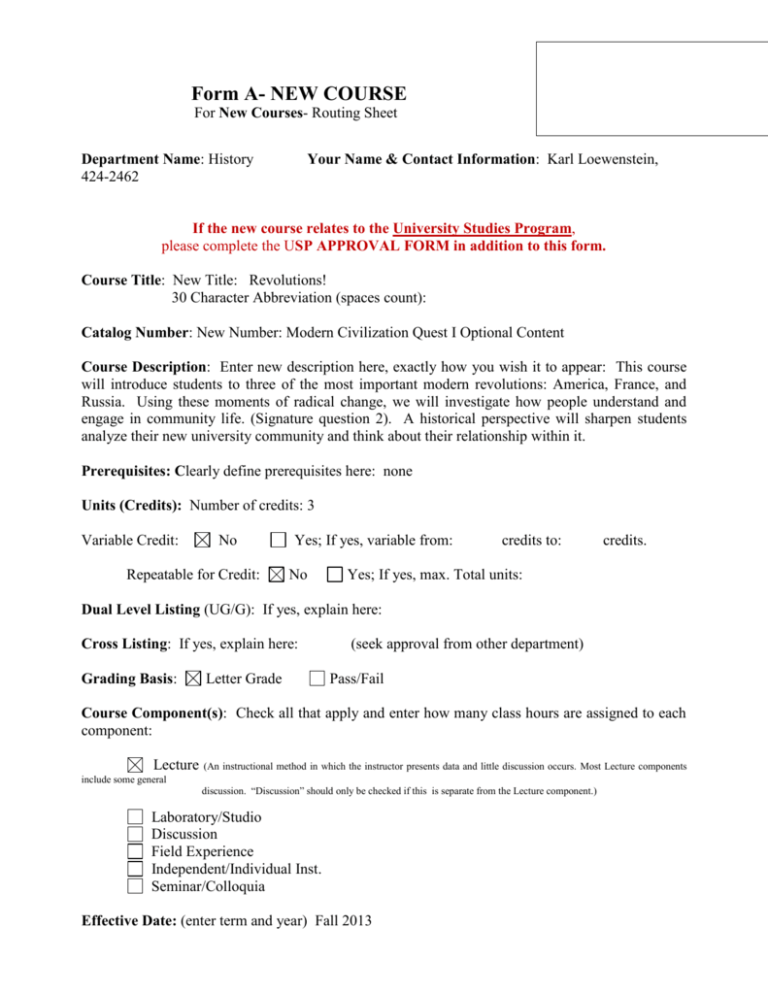
Form A- NEW COURSE For New Courses- Routing Sheet Department Name: History 424-2462 Your Name & Contact Information: Karl Loewenstein, If the new course relates to the University Studies Program, please complete the USP APPROVAL FORM in addition to this form. Course Title: New Title: Revolutions! 30 Character Abbreviation (spaces count): Catalog Number: New Number: Modern Civilization Quest I Optional Content Course Description: Enter new description here, exactly how you wish it to appear: This course will introduce students to three of the most important modern revolutions: America, France, and Russia. Using these moments of radical change, we will investigate how people understand and engage in community life. (Signature question 2). A historical perspective will sharpen students analyze their new university community and think about their relationship within it. Prerequisites: Clearly define prerequisites here: none Units (Credits): Number of credits: 3 Variable Credit: No Repeatable for Credit: Yes; If yes, variable from: No credits to: credits. Yes; If yes, max. Total units: Dual Level Listing (UG/G): If yes, explain here: Cross Listing: If yes, explain here: Grading Basis: Letter Grade (seek approval from other department) Pass/Fail Course Component(s): Check all that apply and enter how many class hours are assigned to each component: Lecture (An instructional method in which the instructor presents data and little discussion occurs. Most Lecture components include some general discussion. “Discussion” should only be checked if this is separate from the Lecture component.) Laboratory/Studio Discussion Field Experience Independent/Individual Inst. Seminar/Colloquia Effective Date: (enter term and year) Fall 2013 Objectives of course: This course will introduce students to three of the most important modern revolutions: America, France, and Russia. Using these three case studies, we will discuss political practices, revolutionary theory, and language of violence. We will engage the question of when community life breaks down. At what point societies break from earlier systems. When does the desire for change turn violent? What drives people to revolt? Why do some reject the traditions of their society? Is there pattern to revolution? Using these large themes, we will develop ideas about how we create and engage with a functioning community. Civic knowledge consists of an awareness and understanding of the various political and social processes that impact the nature and quality of life in local, state, national, or global communities. It also encompasses the cultivation of skills which may be useful in public life, like effective communication and ethical reasoning. Civic engagement means having an appreciation for and applying the values gained from civic knowledge in real world settings, directed at improving the quality of life in the communities of which one is a part. Civic knowledge and civic engagement emphasize learning, reflection, and action in order to create better communities. Course Syllabus (Attach syllabus – cut and paste here): Quest 1: Revolution! Signature Question 2: How do people understand and engage in community life? Karl E. Loewenstein Office: Sage Hall 3613 Office Hours: MWF: ? PM or by appt. E-mail: loewenst@uwosh.edu Office phone: 424-2462 Home phone: 233-4831 Academic Focus This course will introduce students to three of the most important modern revolutions: America, France, and Russia. Using these three case studies, we will discuss political practices, revolutionary theory, and language of violence. We will engage the study of the breakdown of community. At what point do people break from earlier systems? When does the desire for change turn violent? What drives people to revolt? Why do some reject the traditions of their society? Is there pattern to revolution? Using these large themes, we will develop ideas about how we create and engage with a functioning community. Our Signature Question Civic knowledge consists of an awareness and understanding of the various political and social processes that impact the nature and quality of life in local, state, national, or global communities. It also encompasses the cultivation of skills which may be useful in public life, like effective communication and ethical reasoning. Civic engagement means having an appreciation for and applying the values gained from civic knowledge in real world settings, directed at improving the quality of life in the communities of which one is a part. Civic knowledge and civic engagement emphasize learning, reflection, and action in order to create better communities. All Signature Questions The University Studies Program (USP) is your gateway to a 21st century college education at the University of Wisconsin Oshkosh. This Quest I course is the first in a series of courses you will take to introduce you to the campus and all it has to offer, the vibrant Oshkosh community, and the challenges and opportunities of academic life as you pursue a liberal education. In these courses, you’ll be exposed to three “Signature Questions” that are central to a UW Oshkosh education: How do people understand and engage in community life? How do people understand and create a more sustainable world? How do people understand and bridge cultural differences? The Quest classes are designed to provide a solid foundation for the rest of your education here, no matter which major you choose. Your USP courses will also provide the opportunity for you to Explore and Connect as you begin your college education. For further information about the unique general education at UW Oshkosh, visit the University Studies Program website. Outcomes for this course: You will: Gain familiarity with key historical struggles, campaigns and social movements Build capacity to describe comparative civic traditions expressed within and by different cultural groups Understand that knowledge is socially constructed and implicated with power Explore and reflect on your core animating personal values History and the Liberal Arts History is at the center of a liberal arts education. The core of a college education is learning how to become a life-long learner. Starting your Quest at UWO with a historian will send you in the right direction. The very idea of the liberal arts should be seen in its historical context, as the idea gained importance during the early Renaissance. It was then that scholars began to argue that one could not be a virtuous person without the ability to read, write, and think clearly. This tradition extends to our institution. Focusing on the ways that people have thought about radical change and how they carried it out, we will emphasize the larger goals of critical thinking and civic engagement. This knowledge and these skills will serve you well as a citizen and as a person. Co-Curricular Activities You will be required to attend a variety of co-curricular activities this semester. These options may include a campus play, an international film, an art exhibit, a music performance, an athletic event or other public opportunities outside the classroom. Lists of options for each semester will be posted on this website to assist course planning. Assignments Students will read a mix of primary historical sources and more recent texts by scholars to develop a historical understanding of the development of our three crucial moments. Students will be required to read a large variety of works and lead class discussions about them. For each reading assignment, you will have a series of short questions or a longer essay to write. These will help you understand the reading and focus on the key issues of the section. Every other week, one of these assignments will be turned into a 2 page graded essay. Each student will lead at least one class on a specific reading. Then, the student will write an essay about that document and experience. Finally, all students are expected to support their classmates by participating in daily discussions. Each student will have an individual meeting with me in my office at least once during the semester. Participating in the co-curricular activities and submitting your chosen work to your eportfolio will also make up a portion of your grade. There will also be a final examination that will ask students to contemplate the lessons of revolution and community. Readings Hanna Arendt, On Revolution Gordon Wood, The American Revolution: A History Arno Mayer, The Furies: Violence and Terror in the French and Russian Revolutions Assorted primary sources Schedule Week 1 Welcome to UWO Introductions Week 2 What is Revolution? Reading: Hanna Arendt, pp. 1-23 Reflection Essay Week 3 Where do revolutions come from? Reading: Arendt, pp. 45-102 Week 4: Conceptions of Revolution Arno Mayer, chapters 1-2 Week 5: Violence and Terror Reading: Mayer, chapters 3-4 Week 6 America: Why revolt? Reading: Wood, sections 1-2 Week 7 Building toward Rebellion Reading: Wood, sections 3-5 Week 8 Forming a revolutionary nation Reading: Wood, sections 6-8 Week 9 France & Russia Compared Reading: Arno Mayer, chapters 7-8 Week 10 Peasant Distrust Reading: Mayer, chapters 9-10 Week 11 Religion challenged Reading: Mayer, 11-12 Week 12 The External World Reading Mayer, 14-15 Week 14 Review and Final examination Other Essential Information for this Class e-Portfolio The UW Oshkosh ePortfolio provides the opportunity for students to document and connect their learning throughout their college education. In addition, random sampling of these ePortfolios during the Connect course and Capstone course or experience will provide the opportunity for institutional assessment. Students will choose one assignment to submit to their e-Portfolio. This will become practice in almost every class you will take during your years at UWO. Early Alert After the third week of class, you will receive a grade for your overall progress in this course and each of the courses you are taking in your first semester. This process is called “Early Alert.” You will receive this information in an email during the 5th week of classes. Early Alert is designed to help you evaluate your study skills and your class attendance so that you know if you are on the right track. If you need to make some changes, there are resources available to support your academic success. These Early Alert grades are not permanent and will not appear on your transcript. MAP-Works MAP-Works (Making Achievement Possible Works) is a survey that is all about you! To help you have a wonderful first-year of college, we need you to take this survey. You will receive an email from mapworks@uwosh.edu inviting you to take the survey. Advisors, hall directors, instructors and many other people on campus will use this information to help you be successful and to provide you with what you need. You will receive a report with suggestions on how achieve your goals; please review it. Peer Mentor This course will have a peer mentor. This person will enhance your connections to the class, to the university, and to each other. Our peer mentor will help you with your studies and guide you to any academic resources you might need, attending some class sessions and accompanying students to co-curricular activities. Resources available on Campus In the University Studies Program, we want you to be successful. Please visit this resource page (or the D2L course page) to read about all the campus services available to support your success. http://www.uwosh.edu/home/resources) Center for Academic Resources: The Center for Academic Resources (CAR) provides free, confidential tutoring for students in most undergraduate classes on campus. CAR is located in the Student Success Center, Suite 102. Check the Tutor List page on CAR’s website (www.uwosh.edu/car) for a list of tutors. If your course is not listed, click on a link to request one, stop by SSC 102 or call 424-2290. To schedule a tutoring session, simply email the tutor, let him/her know what class you are seeking assistance in, and schedule a time to meet. Writing Center: The Writing Center employs specially trained students with a passion for helping their peers become better writers. The services it offers are beyond merely checking for grammar; instead, the Center strives to teach students the process of good writing. Appointments are free, confidential, and are at your convenience. For more information, email wcenter@uwosh.edu, view their website (http://www.uwosh.edu/wcenter/ ), visit them at SSC 102, or call 424-1152. Reading Study Center: The Reading Study Center is an all-university service whose mission is to facilitate the development of efficient college-level learning strategies in students of all abilities. The center offers strategies for improved textbook study, time management, note-taking, test preparation, and test-taking. For more information, email readingstudy@uwosh.edu, view the website (http://www.uwosh.edu/readingstudycenter) , visit them in Nursing Ed Room 201, or call 424-1031. Polk Library/Information Literacy: Ted Mulvey: Mr. Mulvey is an Information Literacy Librarian who is available to assist you as you access, evaluate, and use information in University Studies Program classes. Phone: 920-424-7329; email: mulveyt@uwosh.edu Other Notes, or Rationale, - clearly describe here: Are New Resources Required? No Yes; if yes, please explain: For COLS Interdisciplinary courses include name of instructor and department: Course content related to other curricula: Is content of this course a duplication of course material already offered with the department, between departments, and/or between colleges? no If so, has the duplication been discussed with the other unit, and what is the rationale for offering both courses? Is course to apply to a major, minor, emphasis, option, certification outside the initiating unit? no If so, a written statement from applicable department(s) should attest that the course would be accepted in that program. Prior to the initiation of the approval process, please contact the Registrar’s office at x3007 for consultation about the possible impact of proposed changes. Registrar:_______________________________________________________ Date_________________ Approvals and Distribution: Print your name; sign your name, date, check only if you want a copy of the approved Form A. Be sure to indicate in the last line any other people who should receive the approved copy. Position Originator (if other Print Name Karl Loewenstein than Dept Chair) Department Chair: Division Chair Curriculum Committee Chair Dean/College Grad Studies (if applicable) USP Chair (if applicable) Provost & Vice Lane Earns Sign Name Date Check here for copy. Chancellor Additional Recipient(s)of (Print name) (Print Email Address) Approved Copy U:\DeBolt -- McQuillan\Course & Program Changes\Forms A,C, Masters & Instructions\New Form A with USP included\Form A - New Course.docx
